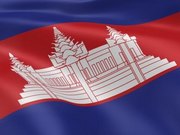Phnom Penh – The end of a year-long post- election dispute between Cambodia’s ruling and opposition parties will build stronger confidence among investors and ease fears of political instability, analysts said Wednesday.
“The political breakthrough is a great step to ensure political stability, which is a key element for attracting investments,” Nguon Meng Tech, director general of the Chamber of Commerce of Cambodia, emphasized.
He said during the year-long political crisis, some investors, especially from the United States and European countries, were reluctant to invest in Cambodia.
“Now, the post-election dispute has been resolved, so I believe that more foreign investors will consider investing in Cambodia,” he said.
In Channy, president and CEO of ACLEDA Bank, the kingdom’s largest commercial bank, said as the political crisis had ended, Cambodia now has enough qualifications for investors.
“Generally, investors take three aspects into consideration before deciding to put their money in any projects. Those are political, economic, and social stabilities. Now, Cambodia meets the requirements,” he said. “The end of political dispute will build more confidence among both local and foreign investors.”
Prime Minister Hun Sen, vice-president of the ruling Cambodian People’s Party (CPP), and Sam Rainsy, president of the opposition Cambodia National Rescue Party (CNRP), held a five-hour negotiation on Tuesday and struck an agreement that will see the CNRP’s 55 lawmakers-elect take their seats in the Parliament after they have boycotted them for a year since a disputed parliamentary election in July last year.
The CPP was declared the winner in last July’s election, gaining 68 seats to the CNRP’s 55. The CNRP immediately refused to accept the results, alleging vote-rigging, and has boycotted the Parliament since September.
The political breakthrough came after the CPP agreed to the CNRP’s requests for an overhaul of the National Election Committee, power sharing in the Parliament and an opposition TV license.
An independent analyst Chea Vannath, former president of the Center for Social Development, said the agreement the two parties reached Tuesday will be a road map for the two parties to implement.
“We hope that the two parties will fully comply with the deal towards real reforms in order to ensure political and economic stabilities,” she said.
Chheang Vannarith, senior researcher of the Cambodian Institute for Cooperation and Peace, said the political reconciliation and breakthrough strengthened the legitimacy of the government and helped concretize deep and comprehensive reforms in Cambodia.
“If the reforms go smoothly, Cambodia will receive more international development assistance and foreign direct investment, which will significantly contribute to poverty reduction,” he wrote to Xinhua in an e-mail. “However, it needs more time to see a real progress.”
As for whether political deadlock can occur again in the next general election in 2018, he said it is unlikely to happen as the composition of the National Election Committee is balanced and neutral.
The CNRP’s 55 lawmakers-elect will soon be sworn and join the 68 CPP lawmakers to amend the Constitution in order to enshrine the autonomy of a new National Election Committee. Source: Xinhua

